
Kale, also known as leaf cabbage, is a green cruciferous vegetable that can be eaten raw or cooked.
Grown in a range of different climates, it is consumed almost all over the world.
Article Navigation
- Helps Fight Cancer
- Protects from Free Radicals
- Helps Keep Your Eyes Healthy
- Protects Against Cardiovascular Disease
- Protects Against Diabetes
- Allows for a Healthy Pregnancy
- Could Help Treat Oral Leukoplakia
- Protects Your DNA
- Helps Maintain Blood Pressure
- Can Help Alleviate PMS Symptoms
- Gives You Healthy Skin and Hair
- Kale and Gut Health
- Improves Energy Levels
- Can Protect Against the Common Cold
- Helps Keep Your Bones Strong
- Protects Against Indigestion
- Protects Against Restless Leg Syndrome
- Helps Keep Your Blood Vessels Strong
- Improves Circulation
- Helps Your Dental Health
- Can Keep Your Kidneys Healthy
- Can Help Prevent Migraine Headaches
- Improves Muscular Function
- Helps With Weight Management
- Helps Keep Your Mood Up
- Conclusion
This leafy green with its vibrant hue and crisp taste makes it more times on lists of healthy foods than almost any other fruit, nut, or vegetable.
And why would it not, being packed with all sorts of beneficial nutrients!
Having gained a reputation as one of the “superfoods” in the health and wellness community, kale boasts nutrients such as vitamin K, vitamin C, vitamin A, manganese, copper, calcium, potassium, and on the list goes.
Moreover, a cup of kale comes with just 33.5 calories, 6.7 grams carbohydrates, and 0.5 grams of fat.
As far as healthy foods go, kale is the best you can get.
If you don’t believe us, go ahead and find out for yourself: below we have 26 valuable benefits of eating kale, all backed by solid scientific evidence.
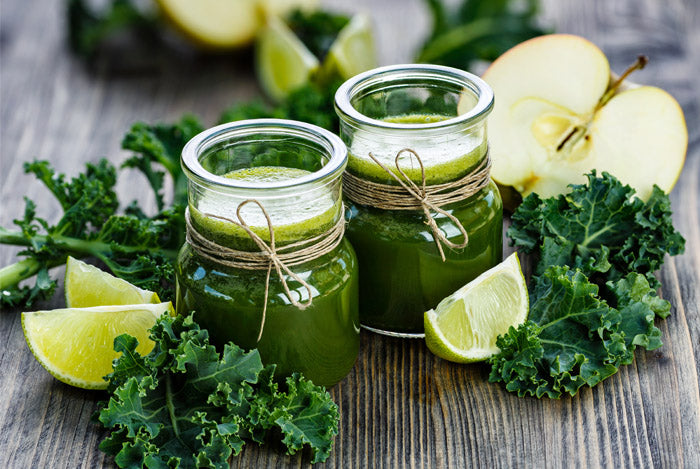
Helps Fight Cancer
The human body is made up of a large collection of cells which grow, divide, and die in order to keep the body functioning as it should.
However, due to a number of possible reasons — many of which aren’t clear even to scientists or medical professionals — some cells can become cancerous and divide at an accelerated rate, spreading into the surrounding tissues.
Such abnormal cell growth leads to cancer, which often involves a tumor and which can attack any bodily organ.
Cancer is a tricky disease to treat, with high relapse rates and high mortality.
On top of that, it can be very draining emotionally and financially for the patient and their caretakers.
While it is difficult to avoid everything carcinogenic in your daily life, eating healthy foods such as kale can go a way toward preventing the development of certain cancers.
This is partly because the nutrients in kale enhance your immune system, equipping it to fight more effectively against mutating cells (1).
Furthermore, kale is a rich source of organosulfur compounds which are broken down by the body into isothiocyanates.
These compounds boost anti-cancer enzymes and neutralize any cancer-causing elements (2<, 3, 4). When kale is chopped or chewed, glucosinolates referred to as sulforaphane also takes effect, altering gene expression and inducing cancer cell death as proven by some animal studies (5). On top of this, other nutrients such as vitamin K and beta carotene have also been shown to be effective to a degree in protecting the body against cancer (6, 7).
Protects from Free Radicals
A big reason for the popularity of leafy green vegetables such as kale in the health community is that they are loaded with antioxidants.
Antioxidants are more than just a buzzword, and it has been proven time and again just how beneficial they are to our health and well-being.
To understand how they work, you first have to revert to your comprehension of high school science and how atoms bond together to form molecules, which compose the trillions of cells that make us.
Electrons in a molecule are generally paired so that they are stable and have low reactivity.
However, sometimes weak bonds result in free radicals which are highly unstable, and which can create a free radical chain as they attempt to gain an electron from the nearest molecule.
Free radicals are actually useful to our immune system to a certain extent, but certain external factors such as pollution, smoke, and others can lead to an accumulation thereof.
This has been linked to a number of diseases, such as atherosclerosis, cognitive decline, inflammation, and much more (8, 9).
The antioxidants in vegetables like kale neutralize these free radicals and prevent oxidative stress.
Some well-known antioxidants in kale are vitamin C, beta carotene, and other flavonoids and polyphenols such as quercetin and kaempferol 10, 11, 12, 13).
Kale also contains manganese, which boosts levels of superoxide dismutase, an enzyme with potent radical-fighting abilities that can help delay signs of aging and the consequences of inflammation (14).
Potassium, also found in kale, too has been found to inhibit free radical formation by vascular cells (15).
Helps Keep Your Eyes Healthy
Humans are largely visual creatures.
Given that your eyes play such an important role in our daily life, it is advisable that you eat the right foods to keep your vision as sharp as possible.
There are many reasons why your eyes grow weaker as you get older.
One is oxidative stress, which might put a strain on your eyes.
Kale, as mentioned above, has lots of antioxidants to prevent this from happening.
Similarly, kale contains the nutrients lutein and zeaxanthin, which are actually required by the eyes to block blue light from reaching the underlying structures of the retina (16).
This prevents light-induced oxidative damage that can later lead to macular degeneration, which is the deterioration of the macula (a small central area of the retina that controls visual acuity).
So Vitamin C can slow the progression of age-related macular degeneration (17), and can also reduce your chances of developing cataracts, which is a medical condition in which the lens of the eye becomes progressively opaque and leads to blurry vision (18, 19).
Similarly, carotenoids like beta carotene, which is found in foods such as kale and carrots, are also great for eye health as they have been proven to reduce the risk of getting cataracts (20, 21).
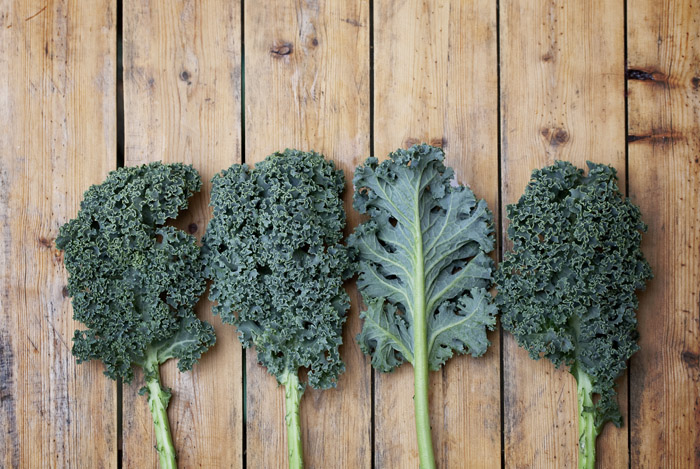
Protects Against Cardiovascular Disease
Your heart plays a crucial role in your immediate survival, so taking care of your heart health should be at the top of your list of priorities.
Cardiovascular disease is a class of diseases that involve the heart or blood vessels and arises mainly due to a process known as atherosclerosis.
Atherosclerosis happens when plaque builds up on the walls of your blood vessels, making the passage for blood narrower.
If a blood clot forms in the passage, you might suffer from a heart attack or ischemic stroke depending on where the blood flow is restricted from reaching, i.e. the heart or the brain.
Kale is a good source of lutein, a xanthophyll and naturally-occurring carotenoid.
Lutein has been proven to lower low-density lipoprotein cholesterol, or LDL cholesterol, which can protect against inflammation due to plaque formation on the walls of arteries (22).
Vitamin C, when taken above the daily minimum dosage, also helps reduce your LDL cholesterol levels and boost levels of healthy HDL cholesterol (23).
Since a cup of kale contains 134 percent of your daily value of Vitamin C, eating it regularly can go a long way toward promoting heart health.
A cup of kale also contains 6 percent of the recommended daily amount of potassium, which has been confirmed by a number of animal studies to be protective against cardiovascular disease (24).
For example, lower rates of cardiovascular disease and coronary heart disease in Japanese men and women have been linked to their high-potassium diets (25).
It has also been shown that potassium effectively helps prevent strokes, with an increase of intake per day over time being associated with a significant reduction in the risk of suffering one 26, 27, 28, 29).
Moreover, there is evidence that lutein not only works to regulate cholesterol but also contributes to thinner artery walls.
The same study shows that men and women with lower serum lutein concentration were five times more likely than others to have thick carotid artery walls, which often leads to cardiovascular disease.
Combined, these nutrients in kale all work to promote the smooth functioning of your circulatory system.
Protects Against Diabetes
Diabetes is a lifelong metabolic disease that leads to the unhealthy increase of glucose, or sugar, in the blood.
Type 2 diabetes happens either because the body cannot produce sufficient insulin — a hormone manufactured by the pancreas — which is required to store excessive glucose from the bloodstream for future use, or because the body’s cells don’t respond as they should to insulin despite adequate production.
Ninety percent of all those with diabetes suffer from this, as Type 1 diabetes is much rarer and is caused by an autoimmune response from the body.
Type 1 diabetes affects millions of people all over the world, and it requires serious daily self-care and lifestyle changes.
It can also lead to severe complications including blindness, limb amputation, kidney disease, cardiovascular disease, and mood disorders.
However, leading a healthy lifestyle in the first place through diet and exercise can prevent its onset.
Cruciferous veggies such as kale contain a compound known as sulforaphane, which has been proven to help control blood sugar levels by reducing hepatic glucose production (30).
For those suffering from diabetes, kale also contains fiber, which has a low glycemic index and can prevent blood sugar spikes after eating high-carbohydrate foods (31, 32).
Similarly, manganese in kale is required for the production of digestive enzymes that oversee gluconeogenesis, or the process of converting amino acids into sugar and then regulating sugar levels in the bloodstream.
When tested on diabetic mice, manganese in their diet was linked with higher glucose tolerance, as well as higher insulin secretion (33).
Kale also contains calcium which, together with vitamin D, can directly affect the cells of the pancreas to control insulin secretion (34).
Studies have proven this connection, showing a marked decrease in risk for developing type 2 diabetes after increased daily intake of calcium and vitamin D (35).
Allows for a Healthy Pregnancy
As one of the most nutrient-dense foods you can find, kale is great for pregnant women.
A cup of kale provides a significant percentage of the daily recommended value for nutrients such as calcium, iron, fiber, copper, and more; it also provides more than the daily value for certain very important nutrients like beta carotene, vitamin C, and vitamin K.
It is important to think about diet and nutrition during pregnancy because the health of both the mother and the child are at stake.
Nutritious food not only provides the necessary compounds to help the child develop properly, but it also ensures that both the child and mother don’t suffer from deficiencies that could harm them in any way.
In addition, some elements of kale work directly to help make your pregnancy smoother.
One of these is iron, a deficiency of which during pregnancy has been shown to increase the risk of a premature birth (which can have consequences such as vision and auditory problems, vulnerability to infections, metabolic problems, and more), low birth weight, and even child and maternal mortality (36).
Kale also contains a fair amount of copper and vitamin C, both of which are useful in helping your body absorb iron better from the digestive tract and store it in the liver (38).
Beta carotene, which is converted into vitamin A by the body, is also extremely important during pregnancy and the breastfeeding period, particularly for lung development and maturation.
One study encourages consumption of leafy green vegetables as a source of provitamin A carotenoid beta-carotene since other sources of vitamin A such as liver foods have not been shown to have the same positive effect (39).
Moreover, the vitamin B6, or pyridoxine, in kale can also help reduce some of the unpleasantness of the experience of pregnancy itself: studies have indicated that sufficient intake of the nutrient can be an effective counter against nausea and vomiting during pregnancy (40, 41).
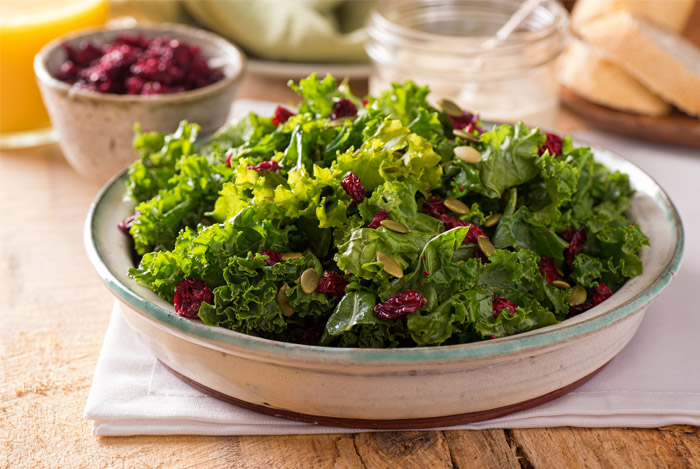
Helps Keep Your Brain Healthy
Your brain is another integral organ when it comes to your health and quality of life.
Your brain and the rest of your nervous system are what allow you to carry out your everyday tasks, and a deterioration in their function could severely impact how you go about these daily activities.
Even if you are still young and unlikely to experience any significant slowing of your mental faculties, exercising your brain and eating the right foods will allow you to be sharper and more efficient at doing mind-related tasks, which can have massive advantages in educational and professional institutions, as well as beyond.
Kale contains at least 45 different flavonoids, all of which act as potent antioxidants to prevent inflammation in the brain or the aging of the brain due to free radicals.
It also contains iron, which is important when it comes to brain health.
This is because iron is required in the formation of hemoglobin which carries oxygen in the blood; since the brain is dependent on oxygen for proper functioning, insufficient iron in the diet could lead to your brain’s acuity faltering and to an inability to concentrate, as well as to learning and memory deficits in children (42).
Even adults’ brains can have decreased structural integrity, without enough iron in the diet (43).
Vitamin K, which kale contains in astonishingly high amounts, is also closely involved with the nervous system since it is needed for sphingolipid metabolism: Sphingolipids are present in brain membranes and play a big role in maintaining brain structure (44).
Vitamin B6 also plays an important role since it controls homocysteine levels, which can damage nerves and neurons if they get too high (45).
It also boosts levels of serotonin and norepinephrine, which are found in low levels in children with learning and behavioral disorders, (46) and helps improve overall cognition by staving off conditions such as dementia, Alzheimer’s, or other cognitive impairment (47).
Vitamin C, on the other hand, has been found to be effective in certain cases against the development of Alzheimer’s disease (48, 49).
Similarly, increased potassium in the diet can change how amyloid-beta peptides in the brain gather to prevent cognitive decline and the onset of Alzheimer’s (50).
And, lastly, copper also helps with thought processes and brain function as it is involved in the processes of specific transporter proteins that help fire neurons to stimulate brain activity; as a result, copper-rich foods improve neurotransmitter signaling and cognitive functions such as memory, communication, alertness, decision-making, and so on.
Could Help Treat Oral Leukoplakia
Oral leukoplakia refers to the formation of white or gray patches or plaque in the mouth which cannot be rubbed off and which aren’t formed due to any causative agent other than tobacco or a manifestation of some other condition.
It appears mostly on the tongue, the inside of the cheeks, the gums, or the floor of the mouth.
Oral leukoplakia is referred to as such mainly when it is idiopathic in nature — that is, when there is no known cause.
It is usually attributed to irritation, prolonged sun exposure, chronic tobacco use, or HIV/AIDS.
Oftentimes it is a symptom of oral cancer and can be seen as lesions before the malignant tumor growth sets in.
According to studies, beta carotene (which is found abundantly in kale), can be helpful in treating oral leukoplakia if consumed daily (51, 52).
Since kale and the beta carotene in it can be taken by the body without fearing for toxicity, it is an effective preventive agent against oral cancer development.
Protects Your DNA
DNA, or deoxyribonucleic acid, is hereditary material that is present in the nucleus or mitochondria of almost all the cells in your body.
DNA is composed of millions of bases of which there are four discrete chemical bases storing information in sequenced code.
DNA replicates when new cells are being formed, essentially helping your body to continue surviving as it is.
However, DNA damage happens thousands of times each day due to both external factors such as radiation and to internal metabolic factors; genomic changes can lead to errors that harm your cells and how they function.
If that damage isn’t repaired, as usual, the cell can either become dormant or die after being apoptotic or, in the worst case scenario, become malignant and cause uncontrolled division which leads to the development of cancer.
Kale can help prevent this by reducing DNA damage in the first place.
Vitamin C, which can be found abundantly in kale, has been proven to fight against imazalil-induced genetic damage (53).
Furthermore, kale has lutein which has been shown to protect against DNA damage due to oxidative stress (54, 55).
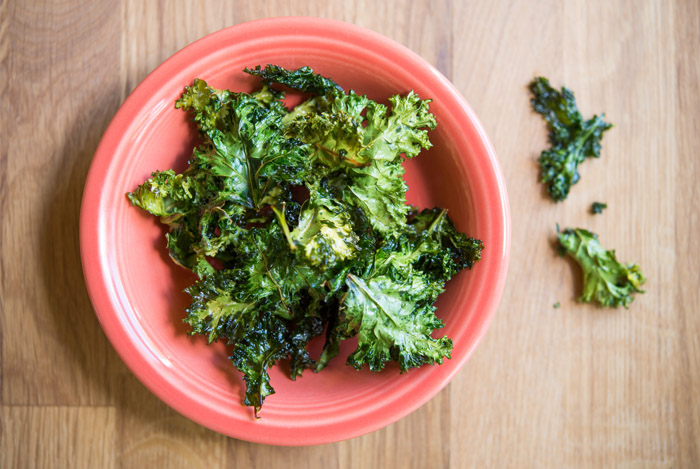
Helps Maintain Blood Pressure
Having a controlled blood pressure is something many of us may take for granted, but patients who suffer from an imbalance know the struggles and complications that can come with it.
Uncontrolled high blood pressure, also known as hypertension, can be very dangerous to your health.
Even if you’re not aware of having high blood pressure, it can gradually cause damage over years without any visible symptoms.
Over time, high blood pressure can damage your arteries and narrow their passage; can cause aneurysms that can rupture and cause life-threatening internal bleeding; can cause coronary heart disease, or enlarge or stiffen your left ventricle; can cause heart failure; can cause transient ischemic attacks, strokes, dementia, or cognitive impairment; can cause kidney failure or kidney scarring; or can damage eye blood vessels, build up fluid under the retina that can impair vision, or damage the optic nerve.
Sometimes, high blood pressure can also cause sexual dysfunction, trouble sleeping, or bone loss.
Kale is a good source of potassium.
In people with high blood pressure, potassium has been shown to reduce arterial blood pressure (56, 57, 58, 59).
This may be because potassium functions as a diuretic, allowing more sodium to be passed in urine; it may also be due to its effect on the natriuretic hormone and the renin-angiotensin-aldosterone system (59).
If you think potassium will lower your blood pressure even if you already are healthy, don’t worry!
A study indicates that even a diet high in potassium does not lower, or lowers very minimally, blood pressure if you don’t have hypertension (60).
Can Help Alleviate PMS Symptoms
Menstruation is uncomfortable for a lot of women, due to its sheer inconvenience.
And suffering from premenstrual syndrome can make the whole experience downright unpleasant for those who have it.
Premenstrual syndrome can manifest itself in a range of symptoms, such as irritability, depression, mood swings, acne, bloating, back aches, cramps, fatigue, food cravings, tender breasts, and more.
It is estimated that roughly three in every four women having menstrual periods experience PMS in some form.
Exercising and getting sufficient sleep can help relieve these symptoms to a degree, but getting the right nutrients in your system can help too.
Calcium levels in your blood can decrease during menstruation because it often involves hormonal fluctuations that can shoot up your estrogen levels, which lowers blood calcium concentration.
Getting calcium through foods like kale can help maintain a balance, and alleviate some of these nasty symptoms (61).
Along with calcium, manganese — also present in kale — also works in a similar way.
One study shows that women with lower manganese concentrations were much more likely to experience pain and mood swings, or dampened moods, during the pre-menstruation period (62).
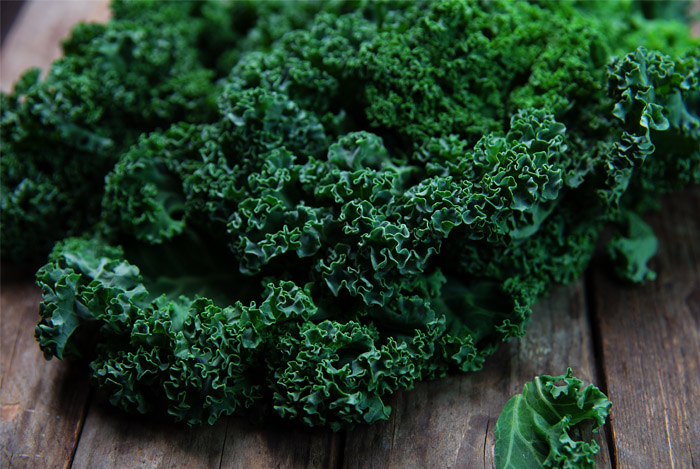
Gives You Healthy Skin and Hair
Healthy skin and hair is not only crucial for an attractive appearance but is also an indication of overall health and nutrition.
Having smooth, unblemished skin and strong, shiny hair can go a long way toward shaping your own self-esteem and confidence, and can also help you gain advantages in a professional or social setting.
Unfortunately, there are many external and internal causes that can cause skin and hair damage.
For example, ultraviolet rays from the sun break down elements of your skin such as collagen and can give you sun spots and decrease skin elasticity.
Similarly, irritants from pollutants, chemical products, or cigarette smoke can also make your skin appear duller and make you more prone to acne or wrinkles.
And your hair can suffer, sometimes just due to hairstyles and manipulations using different products and chemicals, or because of dryness or heat in the atmosphere and mineral deposits from hard water.
The antioxidants such as vitamin C in kale can help prevent skin aging due to free-radical build-up which includes wrinkling, sagging, age spots, sun spots, and fine lines (63, 64).
Beta-carotene also helps protect your skin, since its metabolism takes place in the skin, and it can improve basal defense against skin damage due to ultraviolet radiation, thus preventing skin irritation as well as redness or sunburn (65).
And copper helps the skin since it is needed to produce tyrosinase, an enzyme that allows melanin synthesis.
Copper not only helps provide your natural skin pigment, but it also enhances the formation of collagen and elastin, which are found in the connective tissues of the skin and keep it supple and flexible.
Similarly, copper also prevents the graying and thinning of hair.
Eating kale regularly can, therefore, give you the youthful skin and hair you always wanted.
Kale and Gut Health
Although gut health is something we often overlook, it is actually very important to our overall physical and mental fitness.
Gastrointestinal health is so crucial mainly because of the good bacteria that reside in your digestive tract, which affect your ability to eliminate toxins from your body, the absorbance of different vitamins and minerals from the food you consume, hormone regulation, immune response, and more.
The gut flora that allows for so many beneficial processes to take place properly thrive when they too have sufficient nutrition to feed on; while most of what we eat is digested before it reaches the large intestine, fiber cannot be digested by human enzymes and makes it to the gut mostly as it is.
Dietary fiber, such as that found in kale, thus helps serve as a prebiotic and allows the bacteria in the gut to flourish since they can digest fiber (66, 67).
These bacteria also produce some nutrients that cannot be found in food sources, such as short-chained fatty acids like acetate, propionate, and butyrate, all of which the body requires for healthy function (68).
These fatty acids further nourish the cells of the colon and help prevent inflammation in the gut or disorders such as Crohn’s disease, irritable bowel syndrome, and ulcerative colitis (69, 70, 71).
Along with other fiber-rich foods, kale helps keep your digestive and other systems functioning as they ought to without complications.
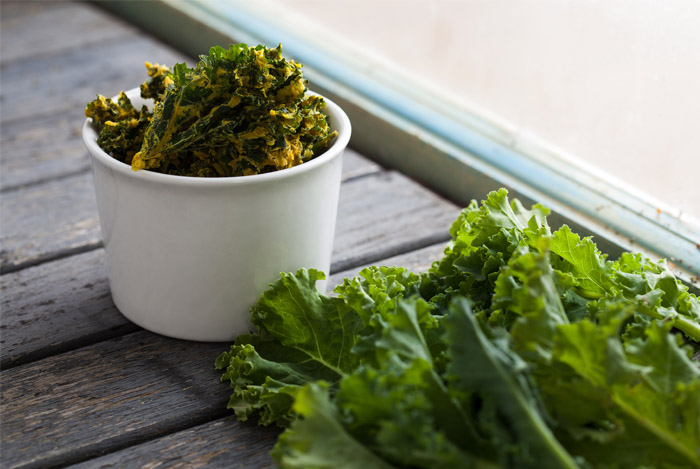
Improves Energy Levels
You need the energy to be able to carry out all the different activities you do in your day-to-day life, and having low energy levels would prevent you from performing at your best, or even being able to enjoy the pleasures of living properly.
Being tired all the time is definitely not fun, and it can ruin the experiences you would normally partake in for yourself and for those around you.
While fatigue can be caused by several different factors, iron-deficiency anemia is one of the most common causes of chronic fatigue.
This is because, without iron, your blood won’t have enough hemoglobin to transport oxygen to all the cells and tissues in your body.
When your organs don’t have sufficient oxygen, you can feel drained of energy and weak.
Iron also helps in metabolic enzyme processes that allow you to absorb protein and other nutrients properly, helping keep you from becoming sluggish (72).
And copper helps give you more energy since it is involved directly in the process of producing ATP, which is created in cell mitochondria and fuels those cells so that your whole body can continue running.
Eating kale goes to a certain length in ensuring that you don’t feel exhausted all the time, and are able to conduct your activities normally.
Can Protect Against the Common Cold
Everybody suffers from a cold every now and then, and it is generally not a pleasant experience.
There are many viruses that can cause you to catch a cold, but rhinoviruses are the most common.
The virus enters your body through your mouth, nose, or ears through droplets in the air emitted by others who are also carrying the virus, or when you use contaminated products or have direct bodily contact with an ill person.
You will be most at risk if your immune system happens to be going through a slump and cannot defend your body well against the attack of the virus.
Generally, you will experience symptoms such as sneezing, drowsiness, sore throat, lack of appetite, or a fever.
Sometimes, complications such as an asthma attack, acute ear infection, acute sinusitis, or other secondary infections might also arise.
One of the most potent nutrients that can protect you from the common cold is vitamin C, of which kale contains a lot.
When you have enough vitamin C in your diet, your chances of acquiring the common cold can be reduced quite significantly (74).
When your body is under stress, such as when attacked by a cold virus, vitamin C can bolster the immune system so that it is better able to defend against symptoms (75).
Helps Keep Your Bones Strong
Bone health is vital in your overall health because as with other parts of your body, it functions to allow you to live and go about your life normally.
Maintaining healthy bones is crucial because that is where the production of your red and white blood cells takes place, and any deterioration there will also cause other side-effects, from fatigue to digestive problems.
Bone cells and stem immune cells also have a symbiotic relationship, so diminishing bone health will also make you more vulnerable to a slew of other diseases and infections.
Bone formation, or the acquisition of bone mineral density, begins from an early stage of development and hits its peak when you’re in your twenties.
After you hit your mid-thirties, you begin to lose bone mass unless you take action to prevent it.
Your bones store calcium over time, so eating kale can give you some of the calcium you require to maintain bone mass.
Vitamin K, of which kale provides a whopping 684 percentage of your RDA, improves bone density and prevents osteoporosis, especially for women after menopause who are at the most risk (76).
High intake of vitamin K helps prevent fractures and bone injury in both normal adults and athletes (77).
Potassium has also been proven to increase the rate of bone formation, and decrease bone degeneration (78, 79, 80).
And copper in kale has been shown to be effective against brittle bones and weak joints (81).
Eating kale regularly will therefore definitely help you keep your skeletal structure strong, and reduce your risk of bone injury or complications due to poor bone health.
Protects Against Indigestion
Indigestion, or dyspepsia, is a common problem that many people just suffer through.
You’ve most likely experienced it — the uncomfortable feeling in your stomach after a meal, sometimes accompanied by a burning sensation or pain in the abdomen.
Other symptoms might include stomach growling, bloating, belching and gas, nausea or vomiting, or an acidic taste in your mouth.
There might also be heartburn if stomach acids rise into the esophagus.
Indigestion can occur because of many reasons, from gastritis to gastroesophageal reflux disease to ulcers and more.
Calcium, found in kale, helps the LEM muscle, or valve between the esophagus and the stomach, stay shut so that acid cannot travel up to your chest and cause pain.
Similarly, the magnesium which is also present in kale helps relax muscles within your digestive tract and also neutralizes stomach acid.
Research has shown that low magnesium levels in your diet often lead to increased experiences of constipation and that consuming more of the nutrient is actually better at reducing constipation than taking lots of medical laxatives (83, 84).
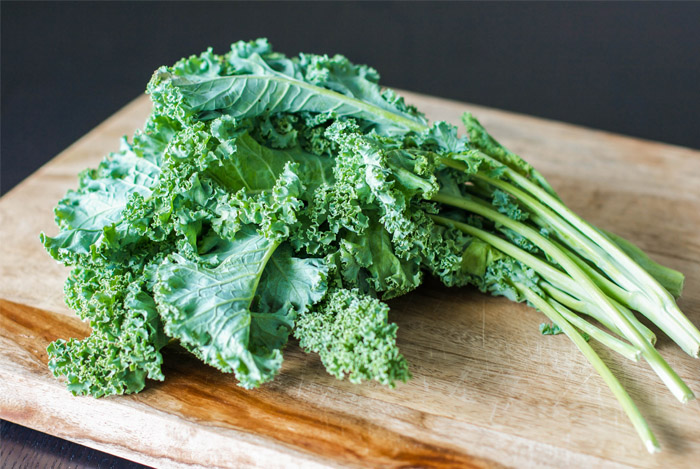
Protects Against Restless Leg Syndrome
Restless leg syndrome is a disorder of the nervous system which causes an urge to move the legs constantly.
People who suffer from this disorder have an irresistible urge to keep moving their legs to relieve an uncomfortable itching sensation that they feel.
It is usually worse when in positions of rest such as while sitting or lying down and can often interfere with proper sleep.
The intensity of the symptoms varies, and the condition can affect individuals of any age and gender, although it is more common in women and adults who are middle-aged or older.
Genetic reasons, pregnancy, medication, or chronic disease can lead to restless leg syndrome, and one of the worst consequences thereof is sleep deprivation which can severely impair your health and lifestyle.
One of the possible causes of restless leg syndrome is also an iron deficiency — low levels of iron in the body have been associated with the condition (85).
Eating iron-rich foods such as kale, therefore, can provide relief, if the underlying cause is insufficient iron in the diet.
Helps Keep Your Blood Vessels Strong
Your blood vessels — veins, arteries, and capillaries — all carry out the extremely important task of transporting blood around your body, whether it be oxygenated blood to your cells, or deoxygenated blood to be filtered for waste to be expelled by the body.
Blood vessels can sustain damage regularly, but exercising and eating well can help keep them strong.
Bioflavonoids such as those found in dark leafy greens like kale are excellent for this purpose, as they strengthen the walls of blood vessels and reduce blood leakage.
Vitamin B6 regulates the levels of a compound known as homocysteine in the blood.
Homocysteine is known to cause inflammation and damage the lining of blood vessels, but adequate vitamin B6 in your diet can reduce these levels and allow blood vessel walls to be repaired (86, 87).
When blood vessel injuries do occur, blood clots or the process of coagulation plays a huge role in repairing the damage.
Platelets and proteins in your plasma come together to form these clots in order to stop bleeding and typically dissolve after the injury is healed.
Without proper clotting, you could suffer fatal internal bleeding.
Since blood clotting uses at least 12 different proteins, and vitamin K provides four of these, foods such as kale can be immensely helpful in ensuring that your blood vessels remain healthy.
Studies have also found that vitamin K can prevent hemorrhagic disease, or an inability to form clots, in newborn children since this condition arises out of a deficiency (88).
Improves Circulation
Your circulatory or cardiovascular, system is constantly working to keep you alive and well.
It transports oxygen and nutrients through the blood to all the different organs, tissues, and cells of your body, and carries waste such as lactic acid and carbon dioxide to be released from your body.
Poor circulation occurs due to blockages in the arteries, or because of smoking, or lack of movement and exercise.
Not only can it cause skin problems, but it can also lead to a host of other problems including organ damage, muscle cramps, carpal tunnel, leg ulcers, and more.
Kale is rich in vitamin C which can help you overcome poor circulation.
It can reduce vascular dysfunction induced by oral glucose load (89).
It can also prevent endothelial dysfunction, or an imbalance between vasodilation and vasoconstriction after cigarette smoking (90).
For those suffering from postural tachycardia syndrome, vitamin C can overcome the poor circulation caused by the abnormally large increase in heart rate (91).
It also helps balance vasodilator response in obese children during mental stress (92).
Helps Your Dental Health
You probably take care of your mouth, teeth, and gums in a regular way by brushing and flossing as required and perhaps doing routine check-ups.
Good oral and dental hygiene can keep your smile looking good, and prevent bad breath, gum disease, and tooth decay.
But you probably haven’t considered the role of nutrition in dental health.
Kale can help protect your teeth from deteriorating because it contains a significant amount of calcium, which is stored partially in the teeth.
It protects against tooth decay as you grow older in the same way as it protects against bone mass loss (93).
Meanwhile, potassium in kale protects your gums by decreasing periodontitis severity.
Potassium-rich vegetables such as kale can do this mainly by fighting against the oxidative stress and inflammation that cause swelling and bleeding of the gums (94, 95).
Can Keep Your Kidneys Healthy
The kidneys perform some essential functions in your body.
The most important ones involve regulating water, removing waste products to balance bodily minerals, and producing certain hormones.
When the kidneys become unhealthy and have diminished function, your body cannot properly eliminate toxins such as urea and creatinine, and your blood contains more minerals than is healthy for you.
Studies in hypertensive rats have shown that a diet rich in potassium can prevent various forms of kidney damage, including vascular, tubular, and glomerular (96, 97, 98).
Higher potassium dietary intake can also reduce the risk of developing chronic kidney disease or cause a regression in chronic kidney disease (99, 100, 101).
On the other hand, without enough potassium your kidneys can really suffer: inadequate levels can lead to cyst formation in the kidneys, or cause interstitial nephritis (102, 103, 104).
Moreover, potassium also prevents the formation of kidney stones, mainly because it decreases levels of calcium in the urine (105).
Kale also has magnesium which, together with potassium, can protect you from cyclosporine-induced kidney damage.
Can Help Prevent Migraine Headaches
Anyone who’s suffered from migraines knows that it is one of the most dreadful experiences.
It often involves severe throbbing headaches or pulsing sensations, as well as sensitivity to light and sound and even nausea and vomiting.
These migraine attacks can last hours if not days and usually disable the individual from being able to carry out their normal routine.
While those who suffer from severe migraines often use medication to get some relief, eating vegetables like kale frequently can also help prevent such attacks.
This is mainly thanks to its magnesium content, which can help release pain-relieving hormones, and also constrict blood vessels to increase blood pressure.
Studies have shown that magnesium can be effective for many in relieving symptoms (107).
Improves Muscular Function
The muscular system is responsible for allowing you to move your body.
Around 700 different muscles are attached to the bones of your skeletal system, and their contraction allows you to propel different parts of your body in different ways to make the move.
Strong, healthy muscle tissue gives you the advantage of better muscle tone and capability to perform better in activities that require muscular use, such as in lifting or doing other physical tasks.
As you grow older, or if you’re leading an inactive lifestyle, your muscles may begin to waste away, which may make it very difficult for you to engage in different activities.
However, potassium can help preserve muscle mass in aging individuals (108) and can neutralize the acids caused by typical western diets so that muscles remain in better shape (109).
Furthermore, kale can also assist in muscle repair after damage due to exercise.
Furthermore, kale can also assist in muscle repair after damage due to exercise.
Vitamin C in kale, for example, has the ability to reduce muscle soreness post-workout, and allow for a speedy recovery so that muscle bulk increases faster (110, 111).
Magnesium also helps prevent muscle aches and spasms by soothing them and aiding in contraction (112).
Helps With Weight Management
Being overweight or struggling with fluctuating weight is an issue that many people relate to.
Extra weight is often looked down upon socially, and those suffering from it may find themselves unhappy with their own bodies or be denied access to opportunities that they would have a fitter physique.
Due to different reasons, from time constraints to low metabolism, you may find it difficult to shed extra pounds even if you wish to.
However, a good combination of diet and exercise can help most people tackle this issue.
When it comes to diet, leafy greens like kale are the perfect option because they are low in calories, sugars, and fats, but can still fill you up.
Kale contains dietary fiber, which can help you feel full so that you are not inclined to eat more than necessary or to snack unhealthily in between meals (113).
By satiating hunger without denying you essential nutrients, kale can help you manage your own weight-loss regime a lot more effectively.
Helps Keep Your Mood Up
While your mood might seem random or circumstantial, it is also highly dependent on your hormones and the chemical reactions happening inside your body.
Neurotransmitters coordinate the transmission of signals from one nerve ending to another and interact with receptors to regulate different processes including emotion.
Mood disorders including depression and anxiety have been found to be linked directly to the imbalance of neurotransmitters such as serotonin, dopamine, norepinephrine, and gamma amino butyric acid (GABA).
Too little GABA can cause anxiety, and also suppress production of other “happy” hormones such as serotonin.
Magnesium can boost GABA levels, and deficiency of magnesium has been linked directly to anxiety in animal tests.
Magnesium also boosts cortisol hormone levels, which are closely related to stress and anxiety responses (114).
Along the same lines, vitamin B6 also raises levels of both serotonin and GABA, helping stave off depression, irritability, anxiety, and other mood disorders (115, 116).
Additionally, vitamin C has also been shown to have a positive effect on both mood and libido, or sexual drive, in human studies (117, 118).
Conclusion
All these benefits just go to show how much you can gain simply by incorporating more kale into your diet.
It cannot be said with certainty that all these advantages will be gained by eating kale regularly, but if you’re leading an otherwise healthy lifestyle and manage to get more kale in your diet, there is no doubt that you will be able to enjoy better overall health over the years.
As a vegetable that is easily available at most grocery stores or vegetable markets, one that has an impressive shelf life of four to five days in the refrigerator, and one that can be enjoyed in numerous ways (kale soups, kale salads, kale smoothies, kale chips, sautéed kale, just regular kale, you name it!), you really have no excuse not to try and make it a part of your diet and nutrition plan!
